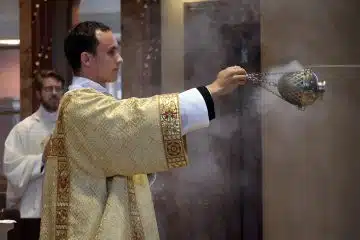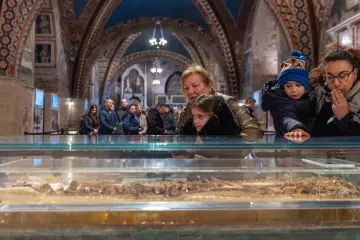Continence for the Kingdom of Heaven (Part 3)

Note: This article is part of an ongoing series on Pope St. John Paul II’s “Theology of the Body.”
As we saw last time, continence for the Kingdom of Heaven is considered a higher calling than marriage. This does not, however, in any way imply a devaluing of marriage, the body, or sexuality. Rather, the sacrifices of continence are only worthy of our esteem when we see them in light of the greatness of marriage and family. Having created the beautiful vocation of marriage as a gift to humanity, Christ calls some men and women to willingly forgo the joys, comforts, and pleasures of marriage and family in order to follow Him more closely, living more radically for God’s Kingdom, and reminding us by their witness that our ultimate fulfillment comes through union with God in the next life.
Rather than opposition, Pope St. John Paul II saw a complementarity between marriage and continence for the Kingdom. He believed that the “attitude” and “values” of these states of life “complete each other” and in some sense “interpenetrate” (TOB 78.4). In his view, both vocations spring from the same fundamental motivation: love. Pope St. John Paul II further observed, “It is a characteristic feature of the human heart to accept even difficult demands in the name of love… and above all in the name of love for a person” (79.9).
Indeed, love moves us to make sacrifices. In marriage, we pledge our fidelity to one spouse, forgoing all others—vowing to love and honor this spouse no matter what. For those who accept the Lord’s call to celibacy or virginity, this love appears “as the readiness to make the exclusive gift of self for the ‘kingdom of God’” (79.8). This gift of self is a “particular response to the love of Jesus the Divine Bridegroom” (79.9). Thus, the free choice to embrace a life of continence for the Kingdom involves “a gift of self understood as a renunciation” of earthly marriage “but realized above all out of love” for Christ (79.9).
“In sum, the nature of the one as well as the other love is ‘spousal,’ that is, expressed through the complete gift of self. The one as well as the other love tends to express that spousal meaning of the body, which has been inscribed ‘from the beginning’ in the personal structure of man and woman” (78.4)
The essence of both marriage and continence for the Kingdom is spousal love. In either vocation, such spousal love is meant to mature into fatherhood or motherhood. Analogous to how marital love matures into “physical fatherhood and motherhood,” continence for the Kingdom is oriented toward spiritual fatherhood and motherhood whereby the supernatural “fruitfulness of the Holy Spirit” can be realized (78.5).
Paradoxically, it is the marriage of Mary and Joseph that reveals the incredible fruitfulness that can come through continence for the Kingdom: “The marriage of Mary with Joseph… conceals within itself… the mystery of the perfect communion of persons, of Man and Woman in the conjugal covenant and at the same time the mystery of… ‘continence for the kingdom of heaven’” (75.3). Pope St. John Paul II taught that the continence for the Kingdom lived out by Mary and Joseph led to “the most perfect fruitfulness of the Holy Spirit.”
“Precisely in the Nazarene conditions of Mary and Joseph’s covenant in marriage and continence, the gift of the Incarnation of the Eternal Word was realized: the Son of God, consubstantial with the Father, was conceived and born as a Man from the Virgin Mary” (75.3).
Thus, “Mary’s divine motherhood” supremely reveals the “fruitfulness in the Holy Spirit” toward which continence for the Kingdom is directed (75.3). Whoever doubts the potential fruitfulness of celibacy or virginity for the Kingdom needs only to look to the Holy Family to be reminded of how the greatest of all the works of the Holy Spirit came about through the continence of Mary and Joseph.
 Dr. Andrew Sodergren, [email protected], is a Catholic psychologist and director of psychological services for Ruah Woods. He speaks on the integration of psychology and the Catholic faith. He and his wife, Ellie, have five children.
Dr. Andrew Sodergren, [email protected], is a Catholic psychologist and director of psychological services for Ruah Woods. He speaks on the integration of psychology and the Catholic faith. He and his wife, Ellie, have five children.
This article appeared in the June 2025 edition of The Catholic Telegraph Magazine. For your complimentary subscription, click here.













